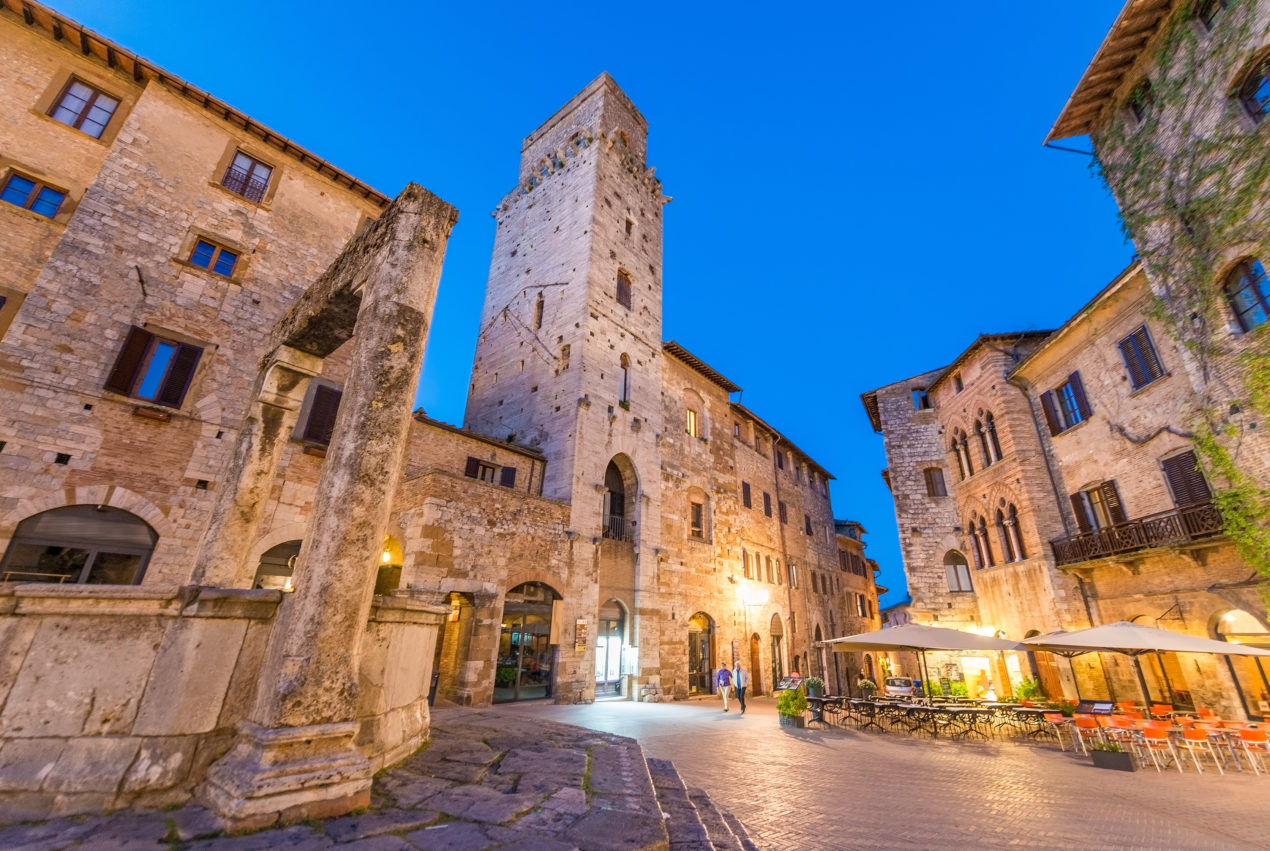Best Itineraries for Exploring Tuscany, Umbria and La Dolce Vita
If you love incredible art, gorgeous landscapes, fabulous food, and world-class wines, then consider dedicating at least a week (preferably two) to exploring Tuscany and Umbria.
Along the way, you’re sure to experience la dolce vita–the sweet life.
I’ve put together some suggested itineraries for exploring this gorgeous region of Italy. No matter how many times I return, I always find new things to see.
And I never get tired to returning to some of my old favorites like Siena and San Gimignano.
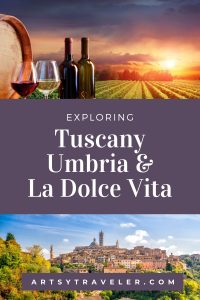
Itineraries at a Glance
Tuscany
- 3 nights in Florence – stay at Serristori Palace Residence
- 3 nights in Siena – stay at Hotel Athena
- 1 night in San Gimignano – stay at Hotel Pescille
Umbria
- 2 nights in Perugia – stay at Hotel Fortuna
- 2 nights in Assisi – stay at Tenuta San Masseo
- 2 nights in Orvieto – stay at Agriturismo Podere Pescara
Map of Tuscany & Umbria
The map of Tuscany and Umbria includes all the destinations mentioned in this post. Click a number to read more about the location.
Suggested Itineraries for Exploring Tuscany & Umbria
Explore both Tuscany and Umbria by car or home-base in one or more of the towns and take day tours to others.
For Tuscany, one strategy is to spend a three nights in Florence (see my suggestions below for enjoying this most Renaissance of cities), three nights in Siena, and one or two nights in San Gimignano. During those five days in the Tuscan countryside, be sure to take a wine tour.
For Umbria, divide your time between the three main towns: Orvieto, Perugia, and Assisi, and reserve time for enjoying the rugged countryside.
If you want to explore Tuscany and Umbria by car, pick up your rental car at the Florence airport. Avoid picking your car up at the train station or some other area in central Florence. You don’t need the headache of navigating your way out of the city.
After picking up your car at the Florence airport, you’ll be out on the highway within minutes.
TIP: Bear in mind that driving in Tuscany and Umbria can be slow going. If you home-base in a specific area or town, reserve a few days for just staying put and enjoying la dolce vita. Spending every day driving the twisting, narrow roads can get tiring.
After a week (or maybe two!) in Tuscany, spend another week in Umbria if time allows. Perugia or Assisi are good choices.
Here are my recommendations for top towns to visit in Tuscany and Umbria.
Tuscany
If you have only a week to see Tuscany, I suggest you make time for Florence and two of the other towns, such as Siena (my favorite) and San Gimignano, with perhaps a day trip to one other town, such as Montalcino or Volterra.
For accommodation recommendations, see Where to Stay in Italy: My Best Picks.
Florence
You kinda have to visit Florence (#1 on the map) because it’s, well, Florence. A sizable percentage of Italy’s finest art is found in Florence, and you owe it to yourself to see it. Unfortunately, half of the known universe descends on Florence every day (or at least that’s how it feels). I remember wondering if the medieval Ponte Vecchio was strong enough to bear the throngs streaming across it.
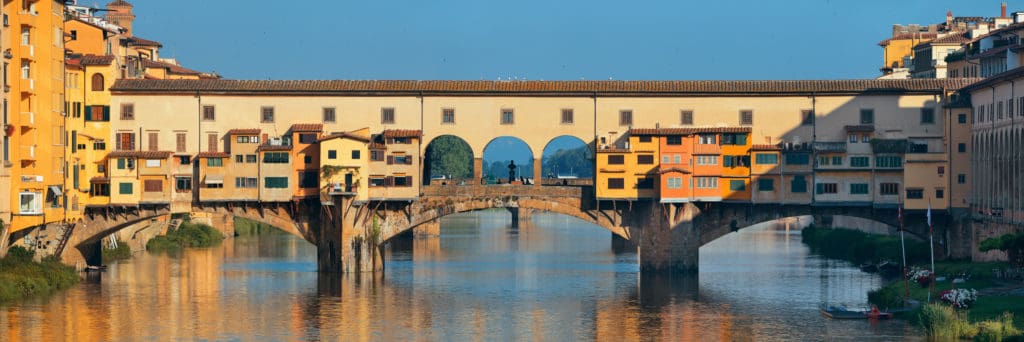
TIP: Combat the crowds by visiting the hot spots, such as the Uffizi, the Duomo, and the Piazza della Signoria in front of the Palazzo Vecchio, early in the morning or late in the day.
During the middle of the day, opt for lesser known but still amazing sites, such as the Masaccio frescoes in the Brancacci Chapel across the river from central Florence and the Museo Nazionale di San Marco which houses the frescoes by Fra Angelico.
Here are sightseeing suggestions for Florence. Make sure you purchase tickets ahead of time for the Uffizi and the Accademia.
Siena
Spend at least two nights, preferably more, in Siena (#2). Siena is my favorite city in Tuscany, with enough great artsy sightseeing to keep you as busy as you want to be. You’ll also have time to just hang out in Siena–walk the narrow cobbled streets, relax in the Campo, and eat a great meal or two complemented by good Tuscan wine.
TIP: When you arrive in Siena, head first to the Campo. If the weather is dry, plop down on the 700-year-old bricks and soak up the history.
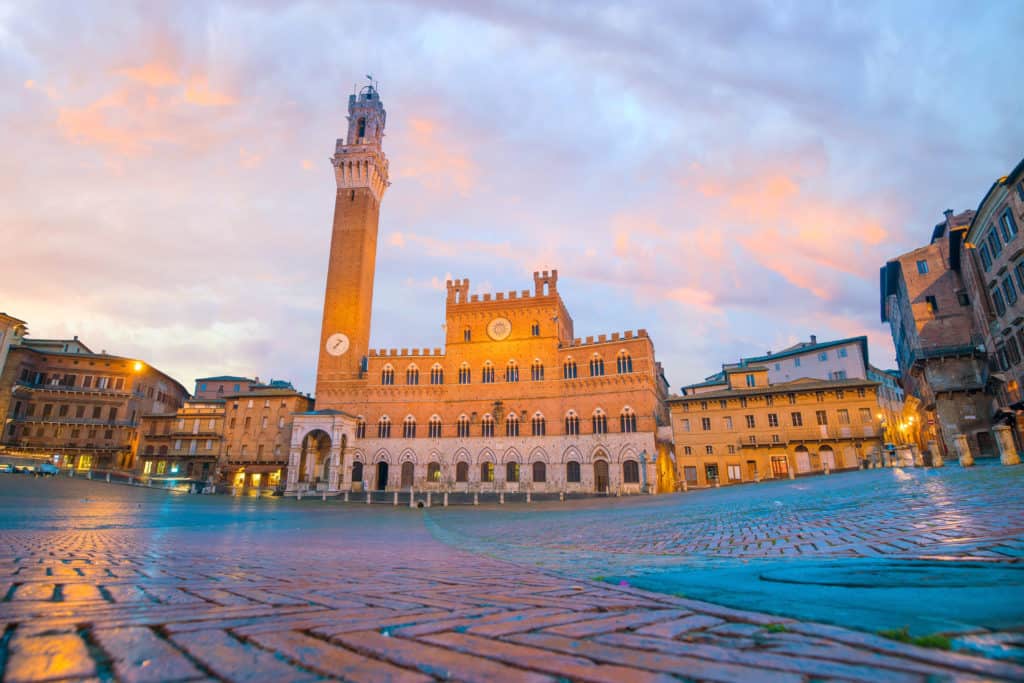
The Campo can get very crowded during the day. Arrive later in the afternoon, enjoy a glass of wine at one of the cafés bordering the piazza, and watch the crowds disperse as the sun turns the Torre Mangia golden. Your glass of wine will be overpriced, but who cares? You have a ringside seat to one of Europe’s most beautiful public piazzas.
Wine Tour
Allocate one of your days in Tuscany to taking a wine tour of the region. Choose a tour that includes Montalcino, home of the scrumptious (and potent) Brunello di Montalcino. The tour I took included a marvelous three-course lunch and visits to three wineries that also included tastings. Let your guide do the driving! Here’s a good option from GetYourGuide:
https://www.getyourguide.com/siena-l435/montalcino-tour-by-minivan-with-brunello-wine-tasting-t8411/?ranking_uuid=8850d226-a5a3-475e-8a24-10260de82bc1
Staying in Siena
You’ll find good accommodation options in Siena in the post Where to Stay in Italy: My Best Picks.
Tours in Siena
Here are more sightseeing options in Siena.
San Gimignano
Yes, it’s crowded during the day with tour busses, but once they leave, you’ll have beautiful San Gimignano (#3), medieval city of towers, all to yourself. Enjoy top-class restaurants and stroll flood-lit streets that, apart from the souvenir shops, have barely changed in 700 years.
For an in-depth look at San Gimignano and why it deserves top billing in your itinerary, read Exploring San Gimignano in Tuscany.
And if you’re looking for something to read while staying in San Gimignano, consider downloading The Towers of Tuscany, my award-winning novel about a female artist in San Gimignano and Siena in the 1300s.
Stay overnight in San Gimignano so you can enjoy this magical city without the crowds. Good options are the Hotel Pescille and the Cappuccina Country Resort, both outside the city so you’ll need a car.
Volterra
Fans of the Medici series on Netflix will recognize the town hall in Volterra (#4) as the stand-in for Florence’s Palazzo Vecchio. Volterra–known as the City of Alabaster–is considerably less crowded than its neighbor, San Gimignano, and has just as much (maybe more) to offer the artsy traveler.
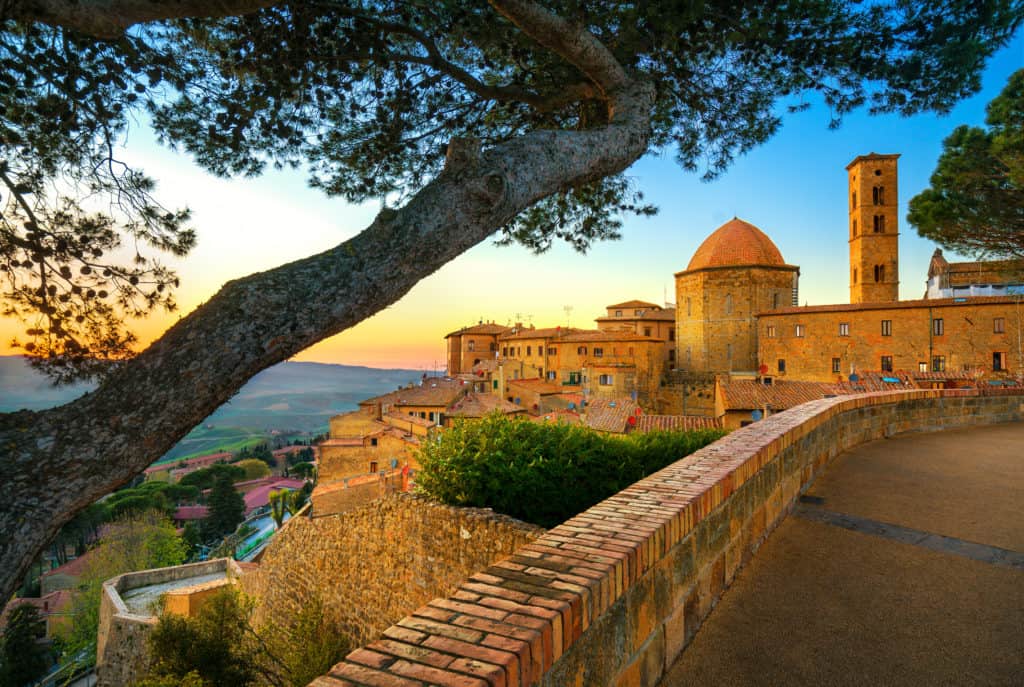
Noteworthy sites include the medieval frescoes in the Palazzo dei Priori, the remains of the Etruscan Acropolis (the Etruscans were big in these parts), the wonderful Guarnacci Etruscan Museum (more Etruscans), and the Roman Theater complex that includes the ruins of 3rd-century baths.
Read more about the Etruscans in the Artsy Sightseeing section of the Italy Destinations page.
Lucca
The walled city of Lucca (#5) is a charming place to spend half a day. Walk along the top of the walls, visit Lucca Cathedral (Lucca is known as the city of a hundred churches so there’s more to choose from), and breathe in the medieval atmosphere.
When we visited, a group of young people dressed in medieval garb were presenting a flag-waving demonstration to the accompaniment of some serious medieval drumming. We were entranced.
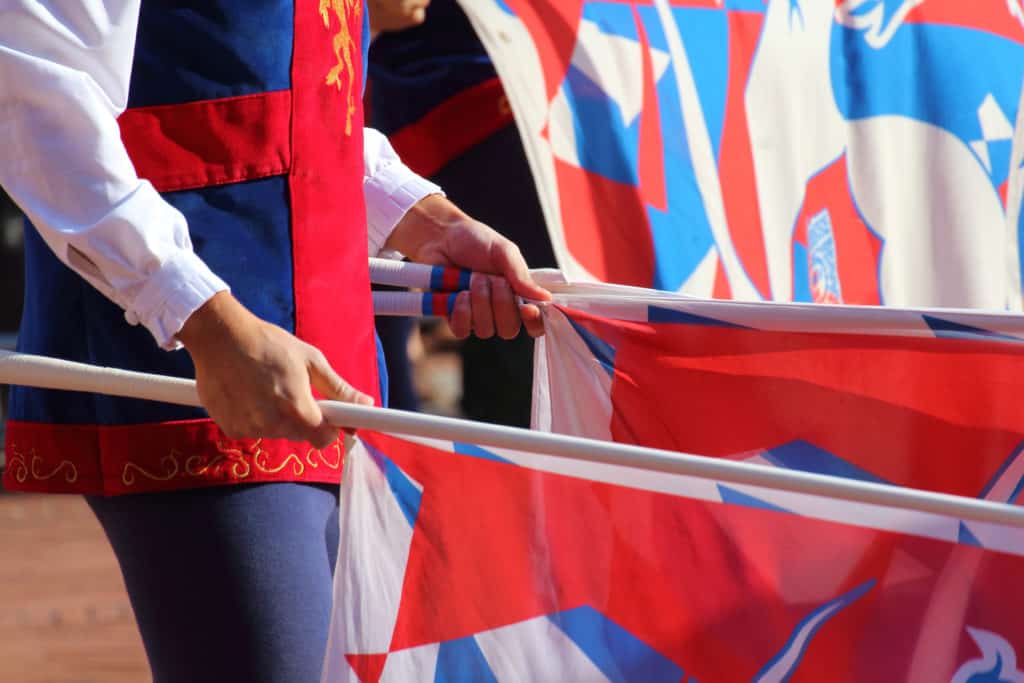
Pisa
I’ve visited Pisa (#6) once, and that’s enough for me, although perhaps I’m being unfair. The area around the famous Leaning Tower teems with tacky souvenir stalls. I like a good tacky souvenir as much as the next gal, but even I reached my limit in Pisa.
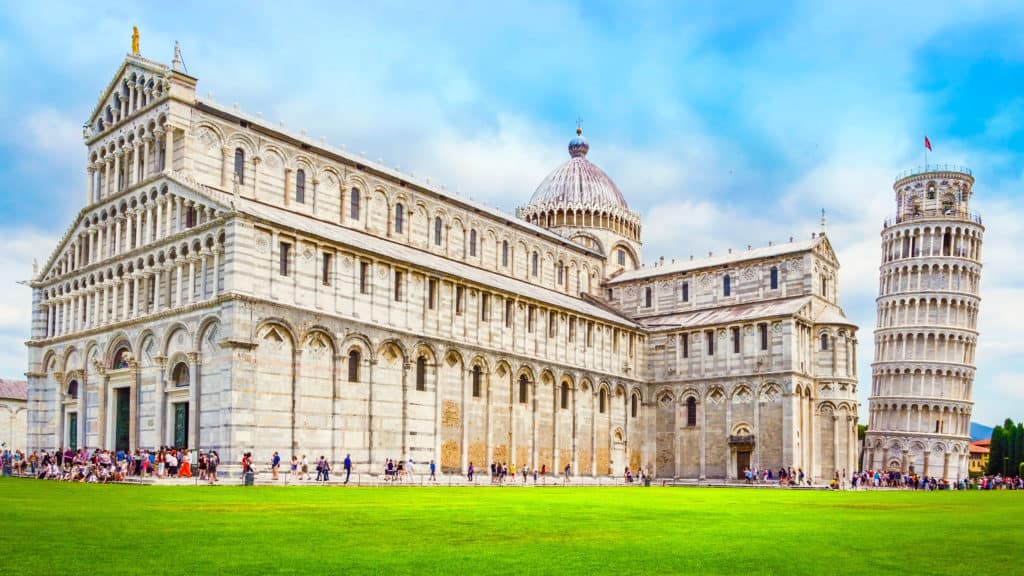
The cathedral is worth visiting, and you must get someone to take the obligatory shot of you holding up the tower. Drop in to Pisa if you’re driving and you have time; otherwise, don’t sweat it. Tuscany has many more treasures to offer.
Other Towns in Tuscany
Tuscany is one of the largest provinces in Italy, with many worthwhile hill towns to visit, including Montalcino, Montepulciano, Monteriggioni, Cortono, and Pienza.
These are all best visited by car. I’ve also traveled in Tuscany by bus, which works fine if you really don’t like driving.
Driving in Tuscany is relatively easy but not speedy. The roads are narrow and twisting. Slow down, relax, and enjoy the journey. Oh – and make way for locals who don’t ‘do’ slow.
TIP: Never (and I mean never!) attempt to drive into a Tuscan hill town. First, you risk getting a stiff fine (being a tourist is no excuse), second, you risk ripping one or both of your side mirrors off your rental car, and third, you risk never again speaking to your partner.
Find the parking lot outside the city walls and walk into the town. Yes, you’ll likely be walking uphill (that’s why they are called hill towns), but some towns such as San Gimignano thoughtfully provide an elevator to take you from the car park to the town. Others don’t, but if you’re going to travel in Tuscany, you need to be up for some good, stiff walking.
Umbria
Umbria (#7) has much to offer the artsy traveler. The landscape is just as stunning as the landscape in Tuscany, with even more rugged mountains, and hill towns as interesting and historic. Highlights include Perugia, Assisi, Gubbio, and Orvieto.
Perugia
Perugia (#8) is the capital of Umbria and one of its largest towns. We enjoyed strolling around the central piazza and ducking into the cathedral. Perugia is laid-back and not overly crowded.
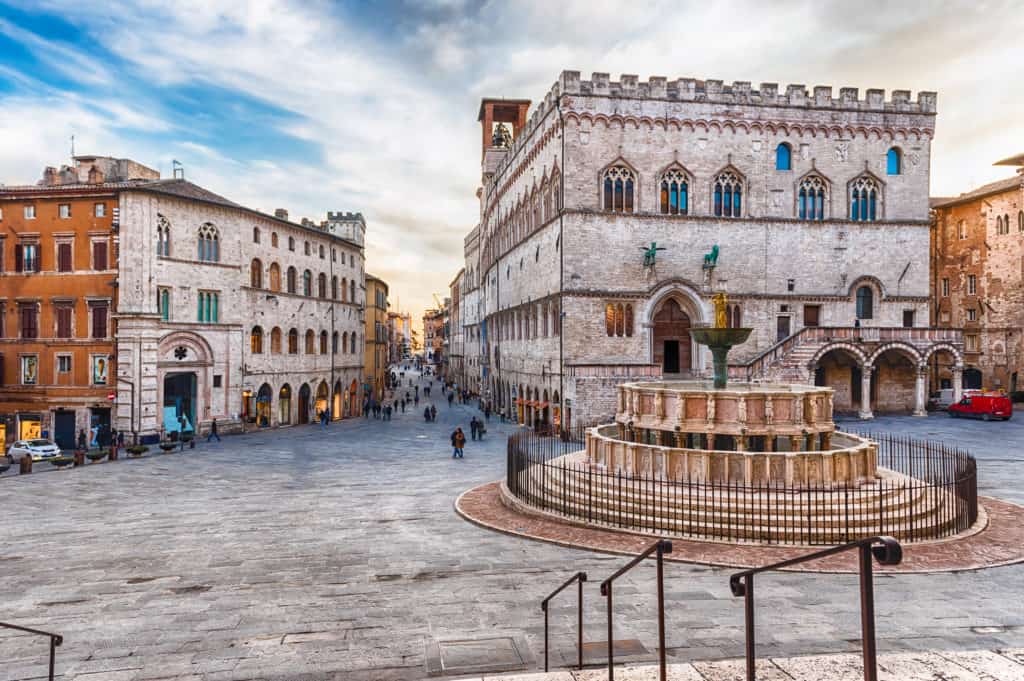
The highlight of our visit to Perugia was discovering the Civic Museum at the Palazzo della Penna. There, we viewed the work of Gerardo Dottori, the leader of the Umbrian Futurists and one of the founders of Aeropainting.
The Palazzo della Penna is one of Perugia’s little-known museums that’s worth seeking out. It’s constructed on the ruins of a Roman amphitheater and an ancient Roman road.
One of the highlights of artsy traveling is looking for these lesser-known but amazing small museums (of which Italy has many). They are almost always deserted, and most contain marvelous collections.
Assisi
One of the hippest things I saw during our visit to Assisi (#9) wasn’t even on the tourist radar. I spied a small sign in a side street advertising a special exhibition of medieval costumes. As an historical novelist with a yen for all things medieval and Italian, I’d found my bliss. Here’s a few of the costumes included in the exhibition.
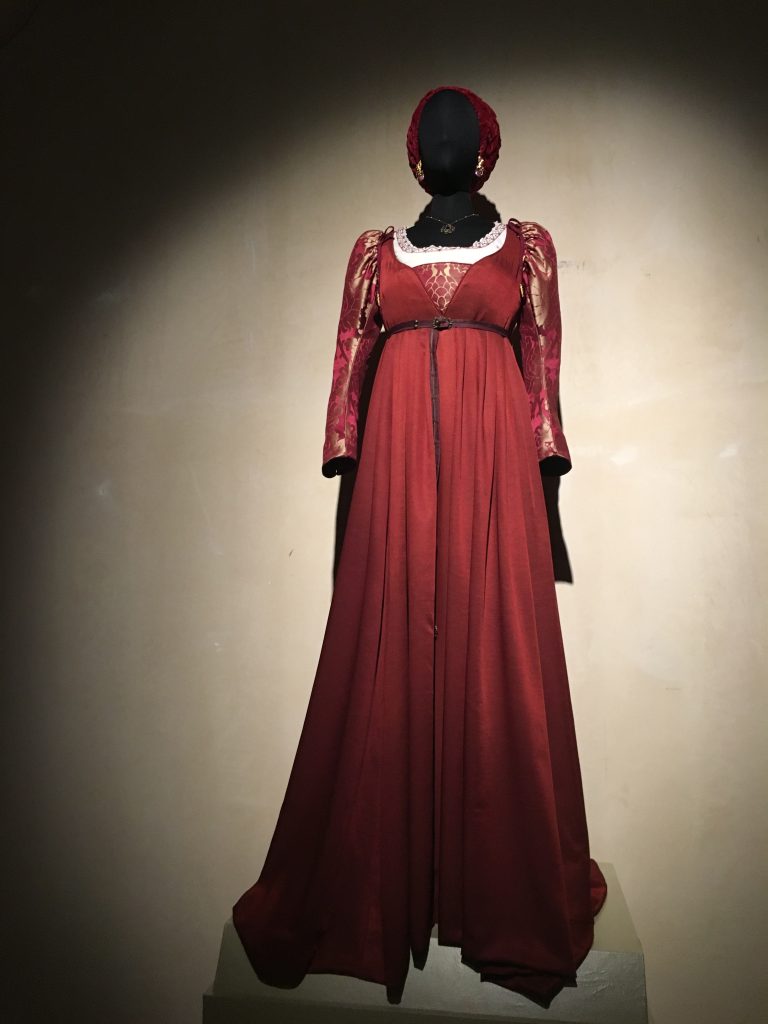
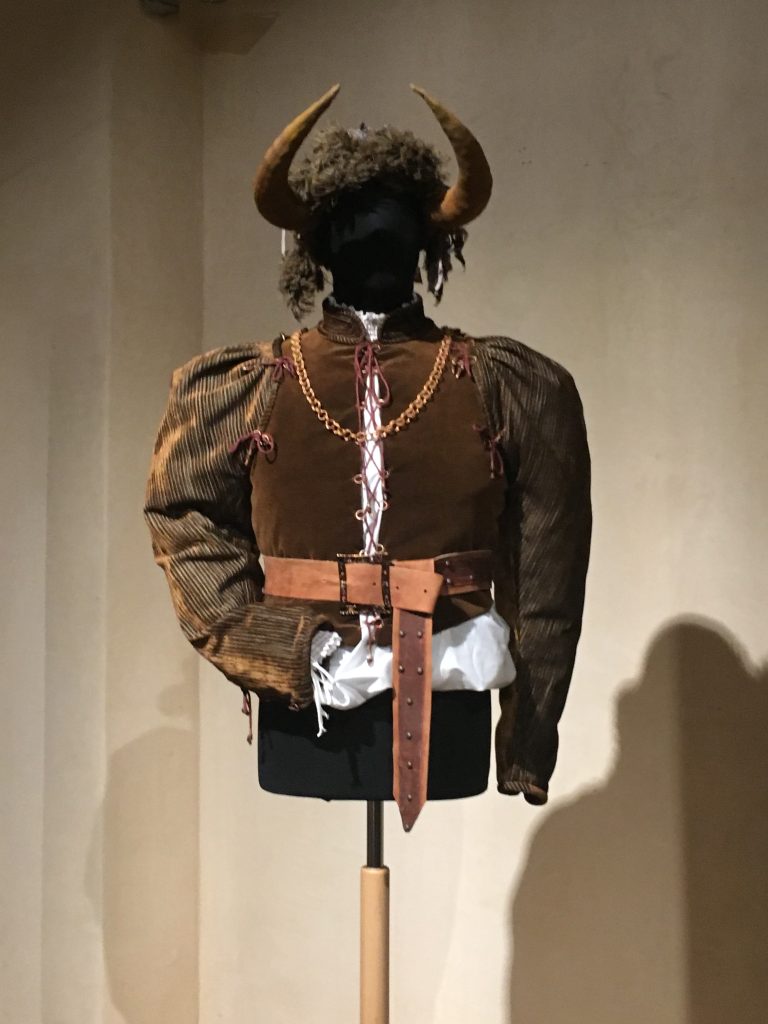
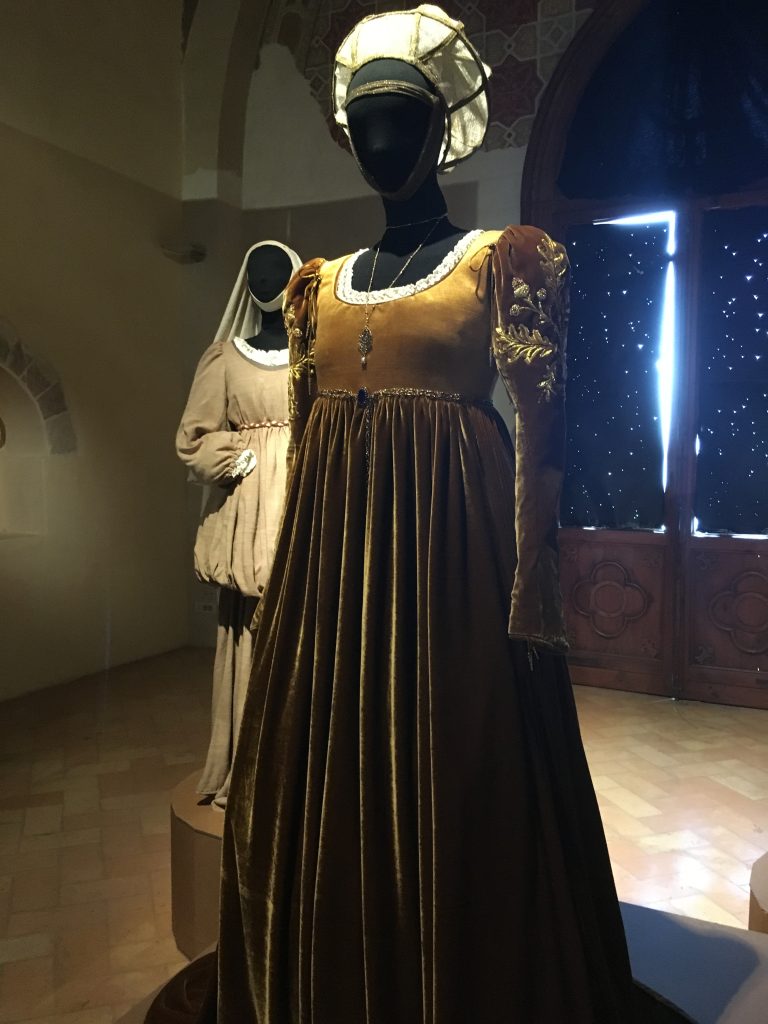
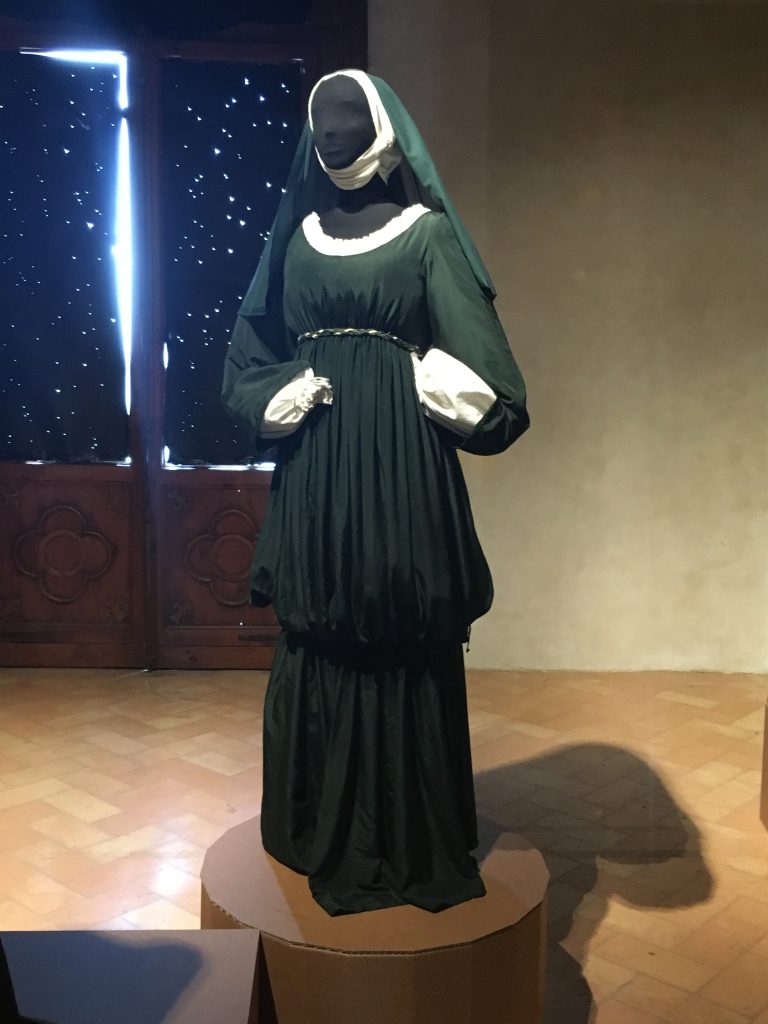
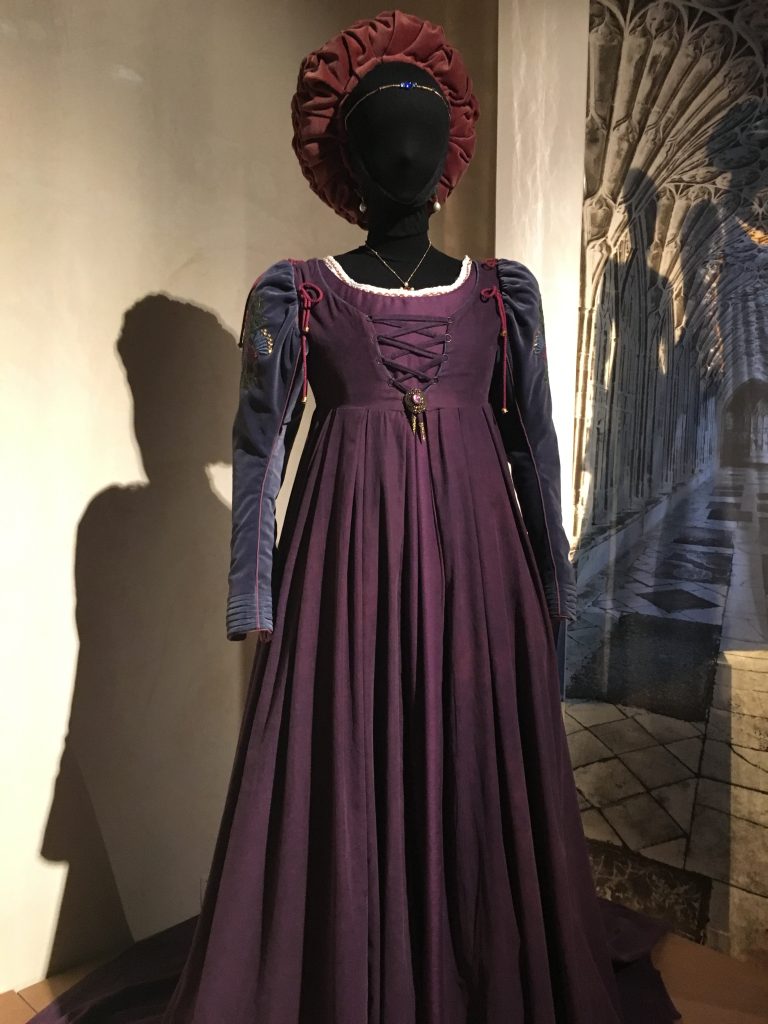
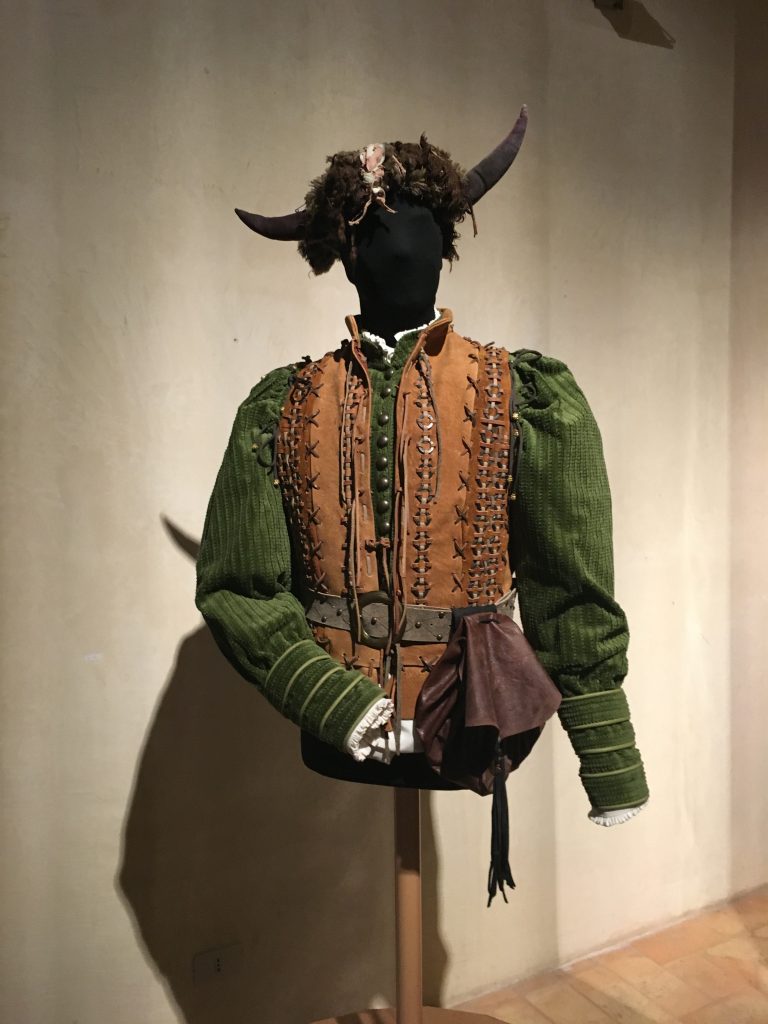
When traveling to small towns in Tuscany and Umbria, check at the tourist office for local exhibitions and events and keep an eye out for posters. You never know what gems you’ll find.
Also taking place while we were in Assisi was an annual festival where all the locals dressed in medieval garb and paraded through the streets. Many other events were included in the festival, but we had neglected to get tickets.
More reason to do your research before you go!
The big draw to Assisi is, of course, the Basilica of Saint Francis of Assisi, with its marvelous frescoes by Giotto. Start your visit to Assisi here, then walk up into the medieval town, and from there continue up to the fortezza for some stunning views.
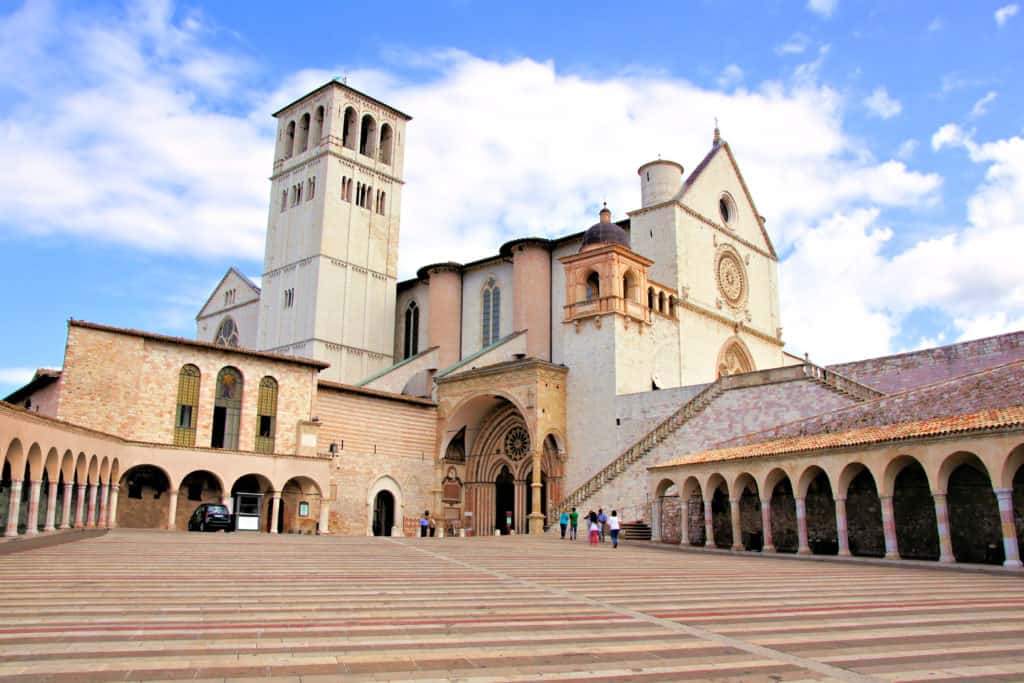
Gubbio
What a delightful town! Nicknamed the City of Fools, Gubbio (#10) is unpretentious and relaxed. We spent a pleasant day wandering its cobbled streets, enjoying lunch in the panoramic Piazza Grande, and visiting the municipal museum.
One of the fun attractions of Gubbio is the Big Barrel, otherwise known as La Botte dei Canonici. The barrel is reputed to be the world’s largest and oldest. It’s worth a photo op, and there’s a gift shop. Entrance is free, so if you pass it during your wanderings around Gubbio, pop in and find out more.
We also checked out the Roman Theatre outside the walls of Gubbio near where we parked.
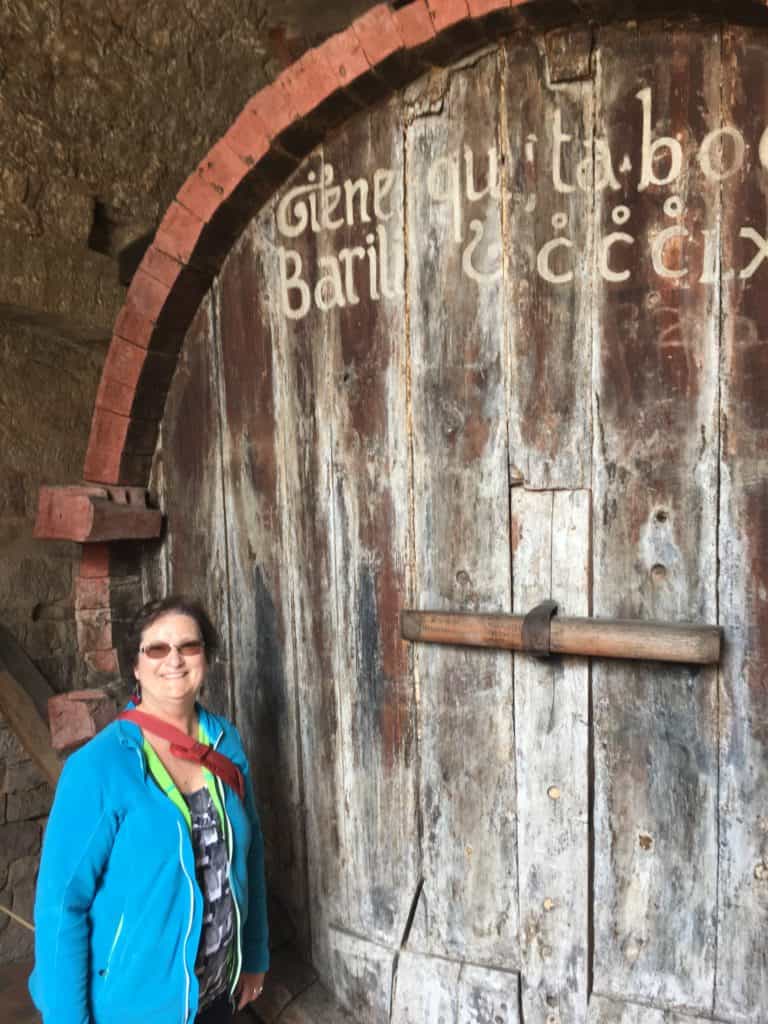
Remember–always park outside the city walls!
Orvieto
The stunning cathedral is the draw to Orvieto (#11), a beautiful Umbrian town perched atop a volcanic plug and worth an overnight stay. Unlike its better known Tuscan counterparts, Orvieto is relaxed and approachable. Park in the large lot at the bottom of the hill and take the elevator or escalator to the medieval upper town.
The facade of the cathedral is unusual in its inclusion of golden mosaics, sculpture, and stained glass.
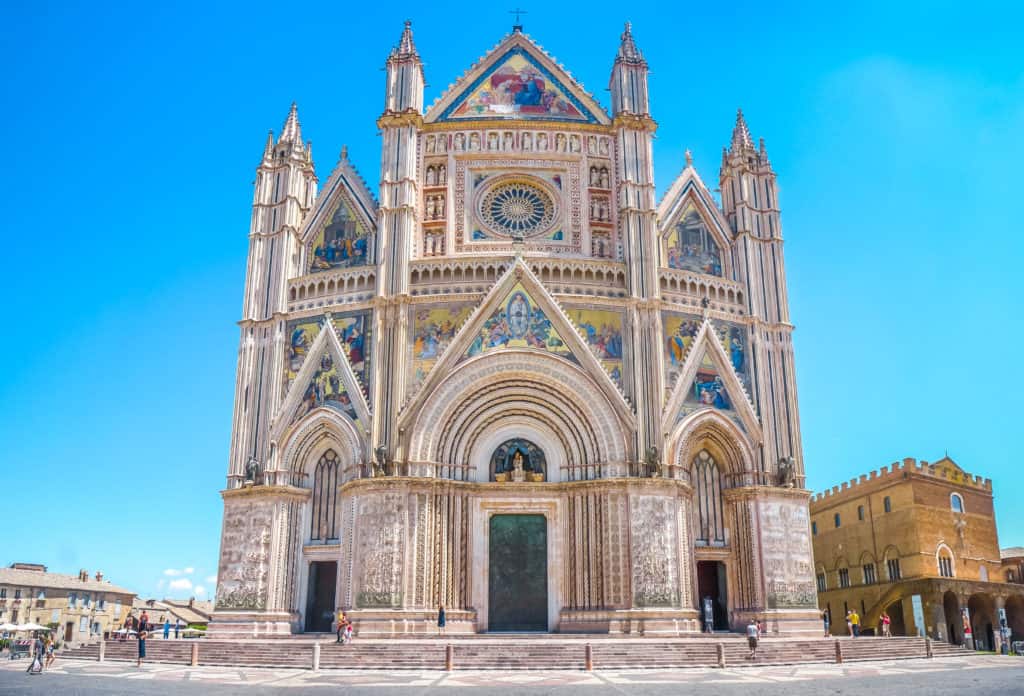
For more information about what to see in Orvieto, check out this article by Rick Steves, my fave travel writer.
Where to Stay
For detailed information about where to stay in Tuscany and Umbria, have a look at my post on Recommended Places to Stay in Italy That Will Make Great Memories.
Enter your destination below to see a map of accommodation options in the region.
Tours in Tuscany and Umbria
Here are some GetYourGuide tour options in Tuscany.
And here are some tour options in Umbria.
Conclusion
Have you visited Tuscany and Umbria? Share your recommendations in the comments below. And to further excite your about this amazing region, here are some more posts about what to see as an Artsy Traveler in Italy:
